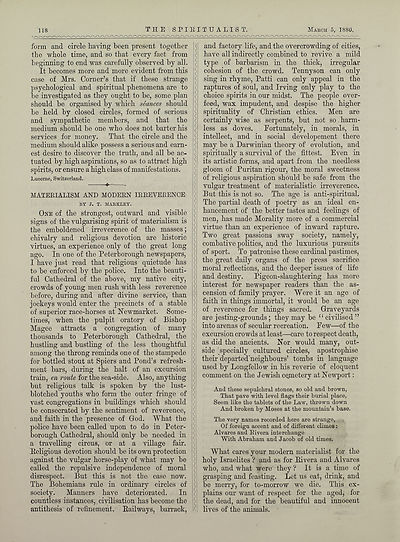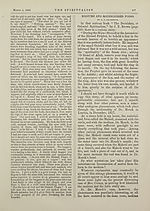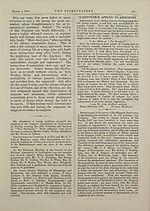Download files
Complete book:
Individual page:
Thumbnail gallery: Grid view | List view

118 THE S PI
form and circle haying been present together
the whole time, and so that every fact from
beginning to end was carefully observed by all.
It becomes more and more evident from this
case of Mrs. Corner’s that if these strange
psychological and spiritual phenomena are to
be investigated as they ought to be, some plan
should be organised by which seances should
be held by closed circles, formed of serious
and sympathetic members, and that the
medium should be one who does not barter his
services for money. That the circle and the
medium should alike possess a serious and earn¬
est desire to discover the truth, and all be ac¬
tuated by high aspirations, so as to attract high
spirits, or ensure a high class of manifestations.
Lucerne, Switzerland.
MATERIALISM AND MODERN IRREVERENCE
BY J. T. MABKLEY.
One of the strongest, outward and visible
signs of the vulgarising spirit of materialism is
the emboldened irreverence of the masses;
chivalry and religious devotion are historic
virtues, an experience only of the great long
ago. In one of the Peterborough newspapers,
I have just read that religious quietude has
to be enforced by the police. Into the beauti¬
ful Cathedral of the above, my native city,
crowds of young men rush with less reverence
before, during and after divine service, than
jockeys would enter the precincts of a stable
of superior race-horses at Newmarket. Some¬
times, when the pulpit oratory of Bishop
Magee attracts a congregation of many
thousands to Peterborough Cathedral, the
hustling and bustling of the less thoughtful
among the throng reminds one of the stampede
for bottled stout at Spiers and Pond’s refresh¬
ment bars, during the halt of an excursion
train, en route for the sea-side. Also, anything
but religious talk is spoken by the lust-
blotched youths who form the outer fringe of
vast congregations in buildings which should
be consecrated by the sentiment of reverence,
and faith in the presence of Grod. What the
police have been called upon to do in Peter¬
borough Cathedral, should only be needed in
a travelling circus, or at a village fair.
Peligious devotion should be its own protection
against the vulgar horse-play of what may be
called the repulsive independence of moral
disrespect. But this is not the case now.
The Bohemians rule in ordinary circles of
society. Manners have deteriorated. In
countless instances,. civilisation has become the
antithesis of refinement. Bail ways, barrack,
RITUALIST. March 5, 1880.
I <i and factory life, and the overcrowding of cities,
j<! have all indirectly combined to revive a mild
j>; type of barbarism in the thick, irregular
|Sj cohesion of the crowd. Tennyson can only
K| sing in rhyme, Patti can only appeal in the
|<! raptures of soul, and Irving only play to the
! [ choice spirits in our midst. The people over-
|)| feed, wax impudent, and despise the higher
Kj spirituality of Christian ethics. Men are
j<! certainly wise as serpents, but not so.harm-
j)j less as doves. Fortunately, in morals, in
Is| intellect, and in social developement there
j<! may be a Darwinian theory of evolution, and
spiritually a survival of the fittest. Even in
! j its artistic forms, and apart from the needless
|s| gloom of Puritan rigour, the moral sweetness
!<j of religious aspiration should be safe from the
| j vulgar treatment of materialistic irreverence.
$ But this is not so. The age is anti-spiritual.
II The partial death of poetry as an ideal en-
| hancement of the better tastes and feelings of
j men, has made Morality more of a commercial
I virtue than an experience of inward rapture.
| Two great passions sway society, namely,
lei combative politics, and the luxurious pursuits
j)j of sport. To patronise these cardinal pastimes,
l)j the great daily organs of the press sacrifice
Is] moral reflections, and the deeper issues of life
II and destiny. Pigeon-slaughtering has more
| interest for newspaper readers than the as-
j cension of family prayer. Were it an age of
I faith in things immortal, it would be an age
I of reverence for things sacred. Graveyards
:A are jesting-grounds; they may be u civilised ”
jS] into arenas of secular recreation. Few—of the
| <I excursion crowds at least—care to respect death,
! I as did the ancients. Nor would many, out-
]>j side ^specially cultured circles, apostrophise
|S| their departedneighbours’ tombs in language
| | used by Longfellow in his reverie of eloquent
| comment on the Jewish cqmetery at Newport:
And these sepulchral stones, so old and brown,
That pave with level flags their burial place,
Seem like the tablets of the Law, thrown down
And broken by Moses at the mountain’s base.
The very names recorded here are strange, ^
Of foreign accent and of different climes:
Alvares and Rivera interchange
With Abraham and Jacob of old times.
What cares your modern materialist for the
j? holy Israelites ? and as for Rivera and Alvares
]>| who, and what were they ? It is a time of
K| grasping and feasting. Let us eat, drink, and
Kj be merry, for to-morrow we die. This ex-
j?j plains our want of respect for the aged, for
];j the dead, and for the beautiful and innocent
jv. lives of the animals.
form and circle haying been present together
the whole time, and so that every fact from
beginning to end was carefully observed by all.
It becomes more and more evident from this
case of Mrs. Corner’s that if these strange
psychological and spiritual phenomena are to
be investigated as they ought to be, some plan
should be organised by which seances should
be held by closed circles, formed of serious
and sympathetic members, and that the
medium should be one who does not barter his
services for money. That the circle and the
medium should alike possess a serious and earn¬
est desire to discover the truth, and all be ac¬
tuated by high aspirations, so as to attract high
spirits, or ensure a high class of manifestations.
Lucerne, Switzerland.
MATERIALISM AND MODERN IRREVERENCE
BY J. T. MABKLEY.
One of the strongest, outward and visible
signs of the vulgarising spirit of materialism is
the emboldened irreverence of the masses;
chivalry and religious devotion are historic
virtues, an experience only of the great long
ago. In one of the Peterborough newspapers,
I have just read that religious quietude has
to be enforced by the police. Into the beauti¬
ful Cathedral of the above, my native city,
crowds of young men rush with less reverence
before, during and after divine service, than
jockeys would enter the precincts of a stable
of superior race-horses at Newmarket. Some¬
times, when the pulpit oratory of Bishop
Magee attracts a congregation of many
thousands to Peterborough Cathedral, the
hustling and bustling of the less thoughtful
among the throng reminds one of the stampede
for bottled stout at Spiers and Pond’s refresh¬
ment bars, during the halt of an excursion
train, en route for the sea-side. Also, anything
but religious talk is spoken by the lust-
blotched youths who form the outer fringe of
vast congregations in buildings which should
be consecrated by the sentiment of reverence,
and faith in the presence of Grod. What the
police have been called upon to do in Peter¬
borough Cathedral, should only be needed in
a travelling circus, or at a village fair.
Peligious devotion should be its own protection
against the vulgar horse-play of what may be
called the repulsive independence of moral
disrespect. But this is not the case now.
The Bohemians rule in ordinary circles of
society. Manners have deteriorated. In
countless instances,. civilisation has become the
antithesis of refinement. Bail ways, barrack,
RITUALIST. March 5, 1880.
I <i and factory life, and the overcrowding of cities,
j<! have all indirectly combined to revive a mild
j>; type of barbarism in the thick, irregular
|Sj cohesion of the crowd. Tennyson can only
K| sing in rhyme, Patti can only appeal in the
|<! raptures of soul, and Irving only play to the
! [ choice spirits in our midst. The people over-
|)| feed, wax impudent, and despise the higher
Kj spirituality of Christian ethics. Men are
j<! certainly wise as serpents, but not so.harm-
j)j less as doves. Fortunately, in morals, in
Is| intellect, and in social developement there
j<! may be a Darwinian theory of evolution, and
spiritually a survival of the fittest. Even in
! j its artistic forms, and apart from the needless
|s| gloom of Puritan rigour, the moral sweetness
!<j of religious aspiration should be safe from the
| j vulgar treatment of materialistic irreverence.
$ But this is not so. The age is anti-spiritual.
II The partial death of poetry as an ideal en-
| hancement of the better tastes and feelings of
j men, has made Morality more of a commercial
I virtue than an experience of inward rapture.
| Two great passions sway society, namely,
lei combative politics, and the luxurious pursuits
j)j of sport. To patronise these cardinal pastimes,
l)j the great daily organs of the press sacrifice
Is] moral reflections, and the deeper issues of life
II and destiny. Pigeon-slaughtering has more
| interest for newspaper readers than the as-
j cension of family prayer. Were it an age of
I faith in things immortal, it would be an age
I of reverence for things sacred. Graveyards
:A are jesting-grounds; they may be u civilised ”
jS] into arenas of secular recreation. Few—of the
| <I excursion crowds at least—care to respect death,
! I as did the ancients. Nor would many, out-
]>j side ^specially cultured circles, apostrophise
|S| their departedneighbours’ tombs in language
| | used by Longfellow in his reverie of eloquent
| comment on the Jewish cqmetery at Newport:
And these sepulchral stones, so old and brown,
That pave with level flags their burial place,
Seem like the tablets of the Law, thrown down
And broken by Moses at the mountain’s base.
The very names recorded here are strange, ^
Of foreign accent and of different climes:
Alvares and Rivera interchange
With Abraham and Jacob of old times.
What cares your modern materialist for the
j? holy Israelites ? and as for Rivera and Alvares
]>| who, and what were they ? It is a time of
K| grasping and feasting. Let us eat, drink, and
Kj be merry, for to-morrow we die. This ex-
j?j plains our want of respect for the aged, for
];j the dead, and for the beautiful and innocent
jv. lives of the animals.
Set display mode to:
![]() Universal Viewer |
Universal Viewer | ![]() Mirador |
Large image | Transcription
Mirador |
Large image | Transcription
Images and transcriptions on this page, including medium image downloads, may be used under the Creative Commons Attribution 4.0 International Licence unless otherwise stated. ![]()
| The Spiritualist > The Spiritualist newspaper > No.393, March 5th 1880 > (12) |
|---|
| Permanent URL | https://digital.nls.uk/137208318 |
|---|
| Attribution and copyright: |
|
|---|---|
| Shelfmark | P.20 |
|---|---|
| Additional NLS resources: |

